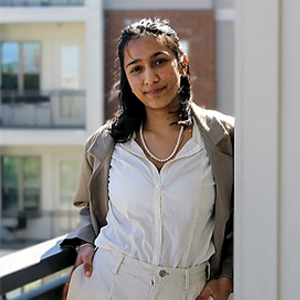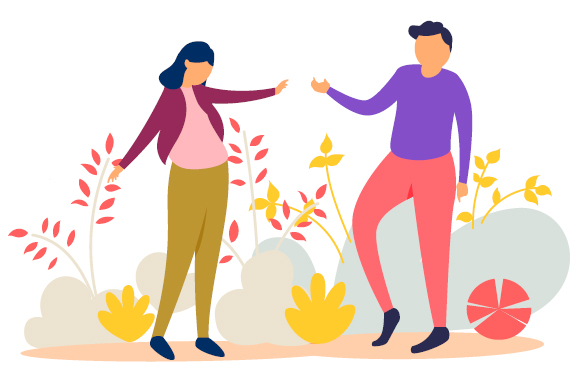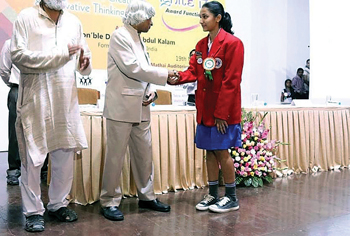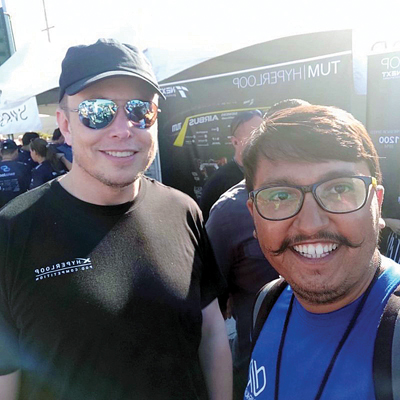Spotlight: Playing for a Better Day

Speaking about her childhood while growing up in Chandigarh and Jammu, Ananya Jain recalls, with much fondness, chasing sprightly squirrels and trying in earnest to feed them.
But she also remembers the dark times around her parents’ separation. “My life involved unwanted media attention, trips to courtrooms and police reports,” she says, keeping her composure on stage while delivering her TEDx talk, How Creative Thinking Saved My Life. Suicidal ideations formed in her young, burdened mind. At 12, she found herself faced with a choice to either fall into the abyss of depression or reach for the light. Jain took her mother’s advice to look beyond her troubles. “I had to push myself and make my life better,” she says.
She did just that and more. Jain cultivated a voluminous appetite for learning, researching and experimenting from early childhood. When most other kids her age would have been consumed by fashion or fitting in, she was learning about Indian farmers grappling with the issue of artificial fertilizers. “I began reading voraciously on a wide range of topics from biochemistry to military strategy. My mind wandered, making connections between the seemingly unrelated biological warfare and political planning. Adults have a lot of experience to draw on. At 12, I had little experience. I was reading and adapting in order to survive.”
Jain tinkered with formulations for fertilizers using cockroach excreta and, much to the dismay of her gardener, tested them on plants around her home. She concocted a viablesolution. Jain’s ingenuity and experimentations led to her being invited to present her findings at a national congregation, for which she ended up bagging the prestigious Dr. A. P. J. Abdul Kalam Award, named after the 11th President of India, bestowed by the Government of Tamil Nadu in recognition of contributions on scientific development, humanities and students’ welfare.
 When Jain moved to the U.S. in 2017, at the age of 18, to study materials engineering at Georgia Tech, she was ensnared in struggles, old and new. She battled loneliness and depression. Demanding curriculums and the urgent need to masterfully calibrate a career trajectory in a new country place an insurmountable burden on students like her. Add to that the inescapable scrutiny on social media and the shifting dynamics of the traditional family structure, and you have a recipe for trouble.
When Jain moved to the U.S. in 2017, at the age of 18, to study materials engineering at Georgia Tech, she was ensnared in struggles, old and new. She battled loneliness and depression. Demanding curriculums and the urgent need to masterfully calibrate a career trajectory in a new country place an insurmountable burden on students like her. Add to that the inescapable scrutiny on social media and the shifting dynamics of the traditional family structure, and you have a recipe for trouble.
Fortunately for Jain, her intense curiosity and concern for the world, along with the knowledge accumulated from all that learning and experimentation, came to her rescue. Even though a “fresh off the boat” student, she found the confidence to launch her enterprise, FullCircle, in 2017 to give concrete direction to her interest in renewable energy. She connected with Ankit Kukadia, an IIT Madras graduate, when he visited California to present his work to Elon Musk at the Hyperloop Pod Competition organized by SpaceX. Kukadia was co-heading the team selected to represent Asia at the competition and had posted online about wishing to meet like-minded people doing innovative things. They soon become collaborators in FullCircle. “I am a materials engineer, and he has a background in aerospace. I am an introvert; he is an extrovert. He is at home in India eating amazing food, and I have nothing to eat,” Jain laughs. She misses the food from home the most.
A compelling call to address the mental health of college students
In due course, FullCircle’s dimensions stretched across borders. Meanwhile Jain’s empathy helped her see that many of her fellow college students were struggling with trauma and depression, and had pretty much no one or nowhere to reach out to. Therapy is expensive, and it may not be immediately available to those who need it the most. It can take weeks to get counseling help at universities. A quote from Jain in a Yahoo News feature reads, “That’s like telling someone, ‘Okay, we don’t have enough capacity for you because we’ve already got so many students that have come to us. If you’re still alive in six weeks, come back to us.’”
Furthermore, therapists charged with helping students may not have the necessary experiences to fully understand and empathize with Gen Z’s strife and strains. “A 50-year-old giving advice to an 18-year-old may not be the best solution,” Jain reflects.
 Kukadia, too, was intimately familiar with issues of mental health. “We are so different, but our struggles were similar,” says Jain. “Getting into IIT is so stressful, and I saw Ananya was also dealing with a lot of stress,” explains Kukadia. “We knew so many young people like us who were dealing with the same kind of stress, and there are so few resources to help with that,” he adds.
Kukadia, too, was intimately familiar with issues of mental health. “We are so different, but our struggles were similar,” says Jain. “Getting into IIT is so stressful, and I saw Ananya was also dealing with a lot of stress,” explains Kukadia. “We knew so many young people like us who were dealing with the same kind of stress, and there are so few resources to help with that,” he adds.
[Left] Ananya Jain receiving the Dr. A. P. J. Abdul Kalam Award, named after the 11th President of India, bestowed by the Government of Tamil Nadu in recognition of contributions on scientific development, humanities and students’ welfare.
The pandemic had further pushed mental health to the forefront. All of this prompted the duo to shift the focus of their enterprise from renewable energy to mental health. “We felt an internal sense of urgency at FullCircle because of Covid-19 when we saw how many students needed remote access to the counseling services at the university.”
Jain and Kukadia know that being able to talk about one’s struggles using a familiar lexicon with someone who has been in a similar situation can be a lifesaver. That is why FullCircle decided to launch an app specifically geared towards helping Gen Z with their mental health challenges.
The FullCircle app: for Gen Z, by Gen Z
Speaking with InTheKnow.com, Jain says, the FullCircle app is “for Gen Z, by Gen Z. It’s where people feel comfortable asking for help and giving help based on shared experiences. When you open the app, the screen has two buttons. One to ask for help, and the other to lend it.” Their goal is to offer an empathetic ear and proffer practical advice in a gaming format.
“Ankit and I would compare our days to see who had a worse week.” And that competition of woes sparked the idea for Speed Ranting, where one can record a monologue of one’s state of affairs. There is no judgment.
The app uses machine learning algorithms and artificial intelligence to send pop-ups with quirky tips. “The idea is for it to be a mental health game—one that doesn’t just confine you to your phone screen but encourages you to connect with other students in the real world: a health-based Pokemon-GO!” Jain elucidates. In the app’s Community Forum, participants are invited to share their thoughts on an interactive platform and engage in conversation if they so choose.
Jain firmly believes in presenting one’s authentic self while gently coaxing others to do the same. Her willingness to share her story of depression resonates with the youth of today who are more willing to open up about their struggles than their predecessors. In her interview with Forbes, Jain says, “The counseling and psychiatry systems are facing a supply chain issue: as more people from my generation seek help, they want newer, more effective solutions.”
The Georgia Tech write-up on FullCircle reads, “FullCircle’s technological innovation lies in the creative elements: a quirky virtual art canvas that visualizes a user’s emotions over time, with a community-based ‘speed ranting’ feature. The wellness game even mimics the comfort of human touch sent through tactile vibrations delivered through the phone.”
“You saved my life”
When asked to grade FullCircle’s performance as a startup—they formed the LLC in August 2020—she gives it a 10/10 without a moment’s hesitation. The stellar evaluation is warranted. FullCircle has been featured by the BBC, Forbes, and other media in South Africa, New Zealand, Australia, and other countries. In 2020, Jain received the Diana Award—an accolade awarded to a young person for international humanitarian
work. Established in memory of Diana, Princess of Wales, the prestigious award is given by the charity of the same name.
“My name is on the Diana Award, but it is for both of us,” she says, giving Kukadia due credit. The award ceremony was a virtual event. “I wish it could have been in person. I would have liked to meet Prince Harry,” Jain says jokingly. Kukadia laughs. Brushing aside the banter, they talk about how the app is touching lives across the world. Grateful messages that read “you saved my life” make it all worth the round-the-clock work.
FullCircle is a collective of designers, animators as well as neuroscience, psychology and computer science majors based in different countries. “We’re looking to partner with more universities to bring the solution to as many students as possible across the world,” Jain says.
Thanks to the influences of her parents’ Hindu and Jain backgrounds, Jain believes that the energy you put out is the energy you will receive. Speaking of their mentor, Jay Sheth, a venture capitalist and former CEO of Karix, Inc., a leading global provider of mobile messaging services, she says, “We are so indebted to him. He is like a father figure to us.” Sheth offered them his assistance when FullCircle was just an idea and continues to help them every step of the way, Kukadia adds.
 When asked to grade FullCircle’s performance as a startup—they formed the LLC in August 2020—she gives it a 10/10 without a moment’s hesitation. The stellar evaluation is warranted. FullCircle has been featured by the BBC, Forbes, and other media in South Africa, New Zealand, Australia, and other countries. In 2020, Jain received the Diana Award—an accolade awarded to a young person for international humanitarian work. Established in memory of Diana, Princess of Wales, the prestigious award is given by the charity of the same name.
When asked to grade FullCircle’s performance as a startup—they formed the LLC in August 2020—she gives it a 10/10 without a moment’s hesitation. The stellar evaluation is warranted. FullCircle has been featured by the BBC, Forbes, and other media in South Africa, New Zealand, Australia, and other countries. In 2020, Jain received the Diana Award—an accolade awarded to a young person for international humanitarian work. Established in memory of Diana, Princess of Wales, the prestigious award is given by the charity of the same name.
[Top] Jain’s collaborator at FullCircle, Ankit Kukadia, with Elon Musk at the Hyperloop Pod Competition organized by SpaceX.
“I was first introduced to Ananya’s initiative under the auspices of the TiE University competition in 2019, in which I was appointed coach/mentor for the Full Circle team. What has impressed me is the level of determination and diligent focus with which the team has pursued their vision to address the mental issues among college-going students. Data shows the problem is huge—it is global, spans across all socio- economic classes and there are no good self-help solutions.The FullCircle initiative has the potential to become the grassroots platform for the millennium community to support each other and provide a very meaningful resource with huge positive societal impact,” offers Sheth.
Engineers are uniquely positioned to solve human problems like mental health pandemic
“Through our work, we hope that more engineers see that it’s possible to apply skills to make great products for society, even outside of working for the Big 4 tech companies,” Jain presses on. “While policy and advocacy work is important, engineers are uniquely positioned to solve human problems like mental health pandemic. These problems are just as complicated, if not more, as building rockets or researching quantum dots. I started FullCircle to bring solutions that I would like to use myself.”
When asked to peer into a crystal ball, Jain envisions a productive and peaceful future for herself—connected to the outside world while being immersed in nature. “Perhaps on a hill in New Zealand, surrounded by goats,” for now, she is content in the U.S., being chased by plum squirrels eager to partake in her lunch.
Author of Kismetwali & Other Stories, Reetika Khanna is an Atlanta-based freelance writer who likes to spotlight people with purpose. She has worked with ELLE as a senior features writer, and as an associate features editor with ELLE DÉCOR, Mumbai. For more, go to ReetikaKhanna.com.
Enjoyed reading Khabar magazine? Subscribe to Khabar and get a full digital copy of this Indian-American community magazine.
blog comments powered by Disqus














